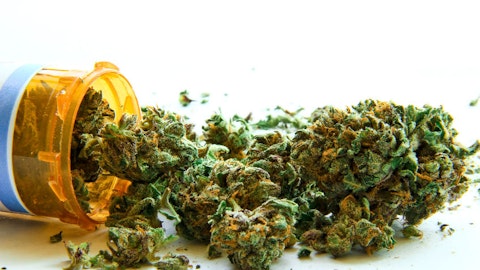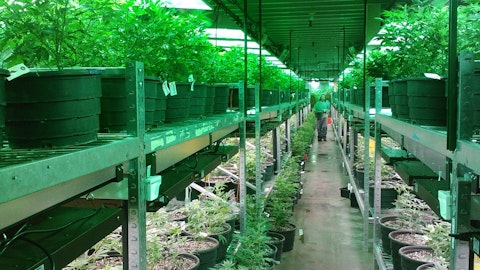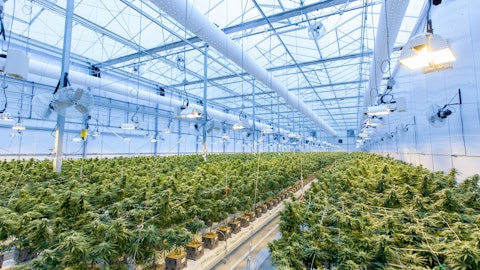Mandesh Dosanjh: Yes. Thanks, Mike. So Pablo, on your question about the OCS announcement, so the OCS announced kind of two main things. They said they’re going to be going to a fixed markup and they’re reducing some of their margins or making that consistent. And the announcement they made was that it was going to have about a $60 million impact to the dollars at OCS, and that was kind of their view. It hasn’t — so some of the details are still forthcoming. There’s a webinar that’s going to be occurring where more details are going to be shared. My understanding is those changes are going to be rolled out later this year. And again, understanding is it’s going to be up to the retail — up to the producer to decide how that give back from the OCS impacts MSRP.
And I think that it’s going to have a meaningful impact on an annualized basis to any producer who has meaningful share. So, if it’s a $60 million impact to the OCS they’re going to be giving back in margin. And let’s just say you have a 10% share. I mean that $6 million is going to be coming back to your margin profile or thereabouts kind of on an annualized basis. So I think we’re excited about it. I think it shows a leadership position in OCS to look at where the market is and understanding that their margin and markup profile was on the higher end of the boards, and they know everything that’s been happening in the market with excise tax and the over taxation. So I plotted yes for the move. I think it was great that they’re looking at that.
And it’s going to be up to the producer now are they going to invest in price or keep the margin. So that’s kind of where it stands, and we’re excited about it. We think the ability to kind of do both, invest in where we need to or take sharpen our pen on pricing, but we believe it’s going to be a margin pickup for ourselves and others in the industry.
Pablo Zuanic: That’s good. That’s very helpful. And then just a follow-up, Mike. Any lessons from the CBD deal, right? I understand the market has worked out for many people that made investments there. So you’re not alone. But were you able to leverage your distribution capabilities on the produce side to improve CBD sales? Just lessons, I guess, I don’t want to call it a postmortem, but in terms of where are we there and what’s the outlook. And then a very short question regarding the Texas optionality. I get the idea, it’s always been about in the future, interstate commerce. But short answer, the fact that you have those greenhouses there doesn’t necessarily give you an edge if Texas was going to implement a medical program, for example, right? If you can comment on that? Thanks.
Michael DeGiglio: Yes. Well, I guess I could self-incriminate myself saying we believe some of the Washington practitioners because when you look at CBD and you talk to the consumers of CBD in the United States, it’s astounding how many people have made CBD products part of their life. And I’m not just saying that because we’re in industry, it’s clear. And the problem is we couldn’t leverage our great relationships on retail because the retailers are waiting for FDA clarity, FDA is in the pockets of pharma, in my opinion. And until as they’ve admitted until there’s an act of Congress clarifying the consumption issue with CBD then the retailers are not going to take it on. Now we do have some retailers that take it on that are bold enough put that realize that it is a very — we have a human endocannabinoid system, which most people don’t realize.
So we don’t have a broccoli system. We have an endocannabinoid system, and it works very well for many parts of our being, so to speak. So it will come. And Washington is the problem. I alluded to that in my calls. It’s not just a problem when it comes to the comprehensive legalization for recreational cannabis, but certainly for something on the health side. We consider our CBD health and wellness. It’s under the envelope or the umbrella of cannabis, but at the same time, it’s really targeted at health and wellness, and it does wonder. So we really have to wait till our politicians get their act together. But I think we very much feel that CBD will be a huge consumer product once that FDA clarity comes. So that’s where it is. On the optionality for Texas, look, I think we’ve proven our business model, I believe that our business model has been proven out in Canada, and that’s the same model for the U.S. If you look at Washington State, California, they’re already trying to push interstate commerce.
It’s going to happen. And I don’t make the bold enough statement to say that if you’re in a major indoor grower in the northern part of the U.S.A., the time will come when it’s not a question of producing good quality, it’s a question of producing good quality at the right price. And you could see what a disaster it is currently with pricing compression and what’s going on. So assuming that there will be clarity in the U.S., then it’s going to go to large scale, low cost, and those existing assets. Yes, we’ve taken a hit last year, but our intent is to be positive on our Fresh business and keep that optionality because to create that will cost hundreds of millions of dollars of capital and years to ramp it up, not to mention getting the talent that really makes Village Farms different than others.
So we’re going to try to stick to the plan but not costing but not losing money. That’s really where we’re focused. Now that being said, we also have other entry points for the U.S. I’m not going to mention where, but we like a regional place. We don’t want to be everything to everybody. And we’re constantly looking at an entry point for 2023 because we’re kind of getting fatigued of having our hands tied behind our back by NASDAQ and the lack of Washington support.





